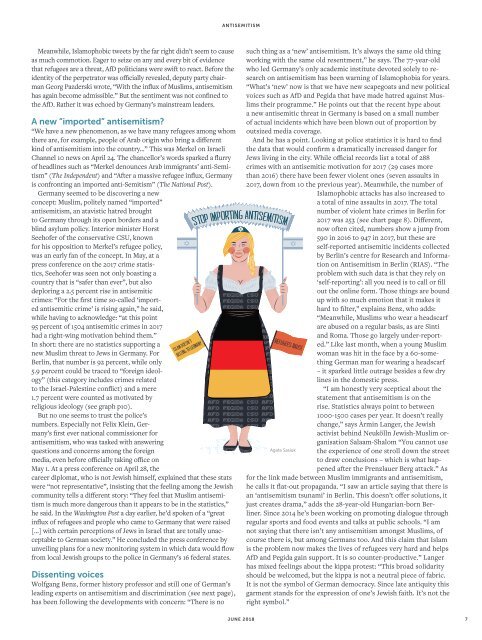EXB 172
You also want an ePaper? Increase the reach of your titles
YUMPU automatically turns print PDFs into web optimized ePapers that Google loves.
ANTISEMITISM<br />
Meanwhile, Islamophobic tweets by the far right didn’t seem to cause<br />
as much commotion. Eager to seize on any and every bit of evidence<br />
that refugees are a threat, AfD politicians were swift to react. Before the<br />
identity of the perpetrator was officially revealed, deputy party chairman<br />
Georg Pazderski wrote, “With the influx of Muslims, antisemitism<br />
has again become admissible.” But the sentiment was not confined to<br />
the AfD. Rather it was echoed by Germany’s mainstream leaders.<br />
A new “imported” antisemitism?<br />
“We have a new phenomenon, as we have many refugees among whom<br />
there are, for example, people of Arab origin who bring a different<br />
kind of antisemitism into the country...” This was Merkel on Israeli<br />
Channel 10 news on April 24. The chancellor’s words sparked a flurry<br />
of headlines such as “Merkel denounces Arab immigrants’ anti-Semitism”<br />
(The Independent) and “After a massive refugee influx, Germany<br />
is confronting an imported anti-Semitism” (The National Post).<br />
Germany seemed to be discovering a new<br />
concept: Muslim, politely named “imported”<br />
antisemitism, an atavistic hatred brought<br />
to Germany through its open borders and a<br />
blind asylum policy. Interior minister Horst<br />
Seehofer of the conservative CSU, known<br />
for his opposition to Merkel’s refugee policy,<br />
was an early fan of the concept. In May, at a<br />
press conference on the 2017 crime statistics,<br />
Seehofer was seen not only boasting a<br />
country that is “safer than ever”, but also<br />
deploring a 2.5 percent rise in antisemitic<br />
crimes: “For the first time so-called ‘imported<br />
antisemitic crime’ is rising again,” he said,<br />
while having to acknowledge: “at this point<br />
95 percent of 1504 antisemitic crimes in 2017<br />
had a right-wing motivation behind them.”<br />
In short: there are no statistics supporting a<br />
new Muslim threat to Jews in Germany. For<br />
Berlin, that number is 92 percent, while only<br />
5.9 percent could be traced to “foreign ideology”<br />
(this category includes crimes related<br />
to the Israel-Palestine conflict) and a mere<br />
1.7 percent were counted as motivated by<br />
religious ideology (see graph p10).<br />
But no one seems to trust the police’s<br />
numbers. Especially not Felix Klein, Germany’s<br />
first ever national commissioner for<br />
antisemitism, who was tasked with answering<br />
questions and concerns among the foreign<br />
media, even before officially taking office on<br />
May 1. At a press conference on April 28, the<br />
career diplomat, who is not Jewish himself, explained that these stats<br />
were “not representative”, insisting that the feeling among the Jewish<br />
community tells a different story: “They feel that Muslim antisemitism<br />
is much more dangerous than it appears to be in the statistics,”<br />
he said. In the Washington Post a day earlier, he’d spoken of a “great<br />
influx of refugees and people who came to Germany that were raised<br />
[...] with certain perceptions of Jews in Israel that are totally unacceptable<br />
to German society.” He concluded the press conference by<br />
unveiling plans for a new monitoring system in which data would flow<br />
from local Jewish groups to the police in Germany’s 16 federal states.<br />
Dissenting voices<br />
Wolfgang Benz, former history professor and still one of German’s<br />
leading experts on antisemitism and discrimination (see next page),<br />
has been following the developments with concern: “There is no<br />
such thing as a ‘new’ antisemitism. It’s always the same old thing<br />
working with the same old resentment,” he says. The 77-year-old<br />
who led Germany’s only academic institute devoted solely to research<br />
on antisemitism has been warning of Islamophobia for years.<br />
“What’s ‘new’ now is that we have new scapegoats and new political<br />
voices such as AfD and Pegida that have made hatred against Muslims<br />
their programme.” He points out that the recent hype about<br />
a new antisemitic threat in Germany is based on a small number<br />
of actual incidents which have been blown out of proportion by<br />
outsized media coverage.<br />
And he has a point. Looking at police statistics it is hard to find<br />
the data that would confirm a dramatically increased danger for<br />
Jews living in the city. While official records list a total of 288<br />
crimes with an antisemitic motivation for 2017 (29 cases more<br />
than 2016) there have been fewer violent ones (seven assaults in<br />
2017, down from 10 the previous year). Meanwhile, the number of<br />
Islamophobic attacks has also increased to<br />
a total of nine assaults in 2017. The total<br />
number of violent hate crimes in Berlin for<br />
2017 was 253 (see chart page 8). Different,<br />
now often cited, numbers show a jump from<br />
590 in 2016 to 947 in 2017, but these are<br />
self-reported antisemitic incidents collected<br />
by Berlin’s centre for Research and Information<br />
on Antisemitism in Berlin (RIAS). “The<br />
problem with such data is that they rely on<br />
‘self-reporting’: all you need is to call or fill<br />
out the online form. Those things are bound<br />
up with so much emotion that it makes it<br />
hard to filter,” explains Benz, who adds:<br />
“Meanwhile, Muslims who wear a headscarf<br />
are abused on a regular basis, as are Sinti<br />
and Roma. Those go largely under-reported.”<br />
Like last month, when a young Muslim<br />
woman was hit in the face by a 60-something<br />
German man for wearing a headscarf<br />
– it sparked little outrage besides a few dry<br />
lines in the domestic press.<br />
“I am honestly very sceptical about the<br />
statement that antisemitism is on the<br />
rise. Statistics always point to between<br />
1000-1500 cases per year. It doesn’t really<br />
change,” says Àrmin Langer, the Jewish<br />
activist behind Neukölln Jewish-Muslim organisation<br />
Salaam-Shalom “You cannot use<br />
Agata Sasiuk<br />
the experience of one stroll down the street<br />
to draw conclusions – which is what happened<br />
after the Prenzlauer Berg attack.” As<br />
for the link made between Muslim immigrants and antisemitism,<br />
he calls it flat-out propaganda. “I saw an article saying that there is<br />
an ‘antisemitism tsunami’ in Berlin. This doesn’t offer solutions, it<br />
just creates drama,” adds the 28-year-old Hungarian-born Berliner.<br />
Since 2014 he’s been working on promoting dialogue through<br />
regular sports and food events and talks at public schools. “I am<br />
not saying that there isn’t any antisemitism amongst Muslims, of<br />
course there is, but among Germans too. And this claim that Islam<br />
is the problem now makes the lives of refugees very hard and helps<br />
AfD and Pegida gain support. It is so counter-productive.” Langer<br />
has mixed feelings about the kippa protest: “This broad solidarity<br />
should be welcomed, but the kippa is not a neutral piece of fabric.<br />
It is not the symbol of German democracy. Since late antiquity this<br />
garment stands for the expression of one’s Jewish faith. It’s not the<br />
right symbol.”<br />
JUNE 2018<br />
7

















